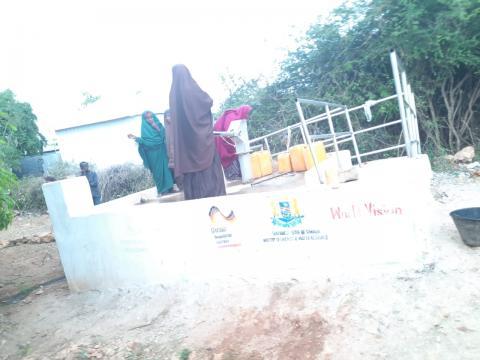Mango shallow well of hope

Horsed Village in Baidoa town settlement in the southwestern Bay region of Somalia has an estimated population of 200,000 people including both Internally Displaced People and the host community. Since 2013, families have been leaving their rural areas in search of water, food and security due to the impact of drought and insecurity. Many families have moved to Baidoa town in seeking for humanitarian assistance.
Horsed village faces challenges of insufficient safe water for domestic use, coupled with poor hygiene practices. This has led to women and girls walking long distances in search of water. They get water from unprotected wells, stagnant pools and seasonal rivers, all of which are open to contamination and predispose them and their households to diseases like cholera and typhoid. The distance also exposes women and girls to sexual abuse.
Asha Mohamed Hassan is a widow and mother of 11 children (six daughters and five sons). She lives with her children in the village. One of her daughters –also a mother of five children– lives with her. Asha's is among households who depend on Mango Shallow Well for water. The well was unprotected, open to contamination and dries up in the dry season. In addition to that, young children and old people were at risk of falling into the well because it was not properly covered. The poor hygienic condition of the well harboured insects, snakes and frogs. During the rainy season, rainwater run-off drained into the wells carrying debris, and excreta which caused the community to experience water-related diseases like diarrhoea and water-washed diseases like chicken-pox.
Asha says “one of the biggest challenges we face is lack of clean and safe water, our shallow well is not reliable, it’s contaminated and dries up in dry season.” She adds: “We walk long distances to get safe water, which exposes most of us to gender-based violence.”

Asha’s children, especially the girls, were not able to attend school on time as they are responsible of fetching water at early ours in morning. “My daughters were not able to continue studying, they go to fetch water early in the morning and get late for class. Some of the girls are adolescents, they also missed their classes during their monthly (menstruation) period when there’s no water at home,” she explains.
“I had a dream that one day my daughters will be able to attend class regularly without any interference caused by lack of water,” adds Asha.
World Vision has made Asha’s dream come true by rehabilitating the shallow well. Working closely with the Ministry of Water, World Vision rehabilitated the Mango shallow well by protecting and raising the apron and installing a hand-pump.
Asha could not hide her joy: “I’m very grateful to World Vision for the support they gave us. They rehabilitated our shallow well, and there is a lot of improvement in hygiene. The water is now clean and safe for drinking. We were also trained on how to operate, maintain and take care of our shallow well. My daughters and other neighbours girls’ will not miss class again because of lack of water,” she says.